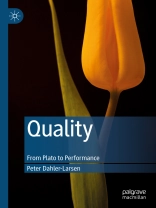The notion of quality features prominently in contemporary discourse. Numerous ratings, rankings, metrics, auditing, accreditation, benchmarking, smileys, reviews, and international comparisons are all used regularly to capture quality.
This book paves the way in exploring the socio-political implications of evaluative statements, with a specific focus on the contribution of the concept of quality to these processes. Drawing on perspectives from the history of ideas, sociology, political science and public management, Dahler-Larsen asks what is the role of quality, and more specifically quality inscriptions, such as measurement? What do they accomplish? And finally, as a consequence of all this, does the term quality make it possible to deal with public issues in a way that lives up to democratic standards?
This cross-disciplinary book will be of interest to scholars and students across various fields, including sociology, social epistemology, political science, public policy, and evaluation.
Table of Content
Chapter 1. Introduction.- Chapter 2: A History of the Concept of Quality.- Chapter 3: Quality Perspectives.- Chapter 4: Quality Inscriptions: Their Makers and Their Consequences.- Chapter 5: Qualitization and Models of Qualitization.- Chapter 6: Quality Without Democracy.- Chapter 7: Epilogue: What to Do.
About the author
Peter Dahler-Larsen is Professor at the Department for Political Science at University of Copenhagen, where he is the leader of the Centre for Research on Evaluation, Measurement and Effects (CREME).






